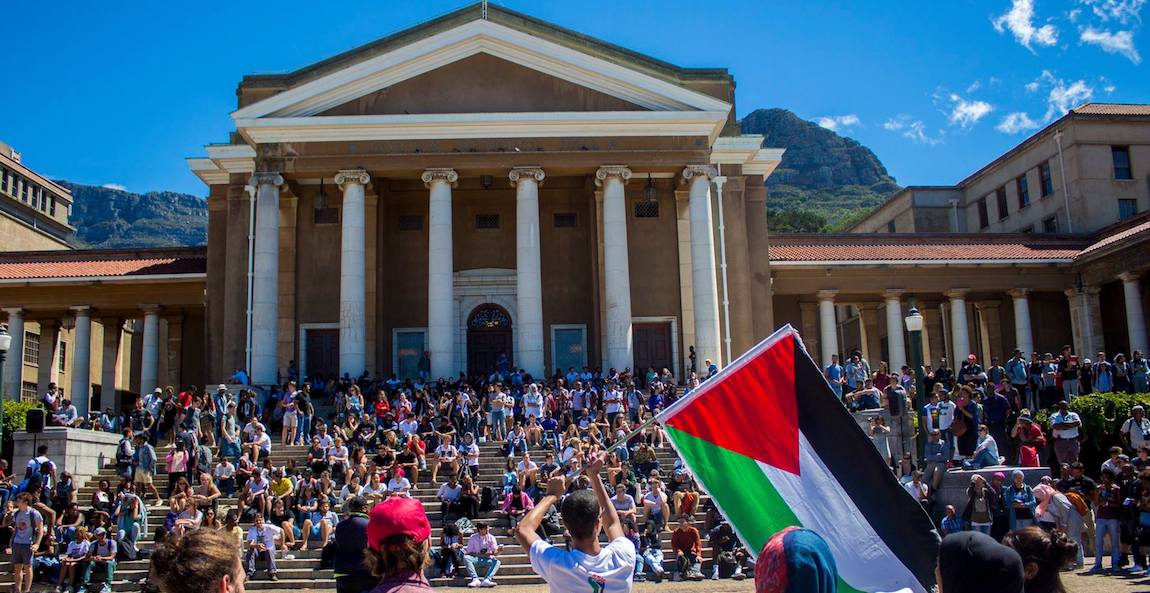By Yaseen Kippie
The debate surrounding a potential academic boycott of Israeli academic institutions by the University of Cape Town (UCT) continues, with UCT’s Palestine Solidarity Forum (PSF) taking up the cudgels to organise a seminar series on exploring all aspects of the boycott. As part of a broader boycott, divestment and sanctions campaign, the aim is to isolate Israel in order to force a change in Israel’s discriminatory policies towards Palestinians, including oppressing the academic freedom of Palestinians.
According to the global BDS campaign, for decades, Israeli universities have played a key role in planning, implementing and justifying Israel’s occupation and apartheid policies, while maintaining a uniquely close relationship with the Israeli military. UCT is not unique in this approach as proposals for an academic boycott of Israel have been made by academics and organisations in Palestine, the United States and the United Kingdom.
Claims of ‘anti-Semitism’
But the PSF’s campaign has been met with strong criticism by the South African Zionist Federation (SAZF), who has called it an “inherent anti-Semitic campaign that is patently obvious to anyone willing to see”. Rowin Polovin, the chairman of SAZF, labeled the call for a boycott as anti-Jewish and “counter to the very ideals of academic freedom.”
“The PSF has connections to the anti-Semitic BDS movement, which directly targets the one and only Jewish state. These calls replicate the anti-Jewish polities of German universities from 1933 onwards, where Jews were banned simply for being Jews.”
He further refuted the notion of an academic boycott in general.
“We reject the principle of an academic boycott of any country. Bringing politics into academic life is negative, unproductive, and not conducive to dialogue that should happen.”
But Haseena Solwa, an executive member of the PSF, countered his argument, saying the Jewish religion is not being targeted.
“Judaism is a religion and Zionism is a political ideology. We are not boycotting Israeli universities for being Jewish, but for being complicit in the oppression of Palestinians. Stats show that only 38% of Palestinians have been able to do a grade 12 equivalent, whereas 88% of Israelis have. This shows the massive disparage in education.”
A Jewish executive member for the PSF, who asked to remain anonymous, responded to Polovin’s comparison of the boycott to Nazi Germany’s treatment of Jews.
“It’s repugnant to suggest that this is similar to Nazi Germany. It insults those people who suffered. It shows the lack of a very basic understanding of history.”
Academic isolation
He also expressed the significance of an academic boycott.
“In 2004, Palestinian civil society called on international organisations to boycott the Apartheid Israeli state economically, culturally and academically. We have taken up this mandate to push and campaign for this boycott. Boycotts as a political strategy isolates the state, making it a pariah state. The further isolated it becomes; the more difficult it becomes to maintain the facade of everything in that state being alright. If international relations can show the perverse situation in Israel as a punitive measure against Israel, it will be forced to concede to the human rights of Palestinians.”
Back in 2011, University of Johannesburg was the first institution to officially sever relations with an Israeli university – a landmark moment in the growing boycott, divestment and sanctions of Israel campaign.
In December 2015, over 200 South African academics from different universities signed a declaration committing themselves to supporting the rights of the Palestinian people. The academics pledged not to accept invitations to visit Israeli academic institutions; not to act as referees for Israeli institutions; and not to participate in conferences organised or funded by Israeli institutions. Signatories include professors from universities across the country, as well as academics from South African research institutes and think tanks. Their declaration follows a similar commitment by 600 academics in the UK which was issued a few months earlier.
Processes underway
The current stage in the process of the boycott is still early. Having, this week, made presentations to the Academic Freedom Committee (AFC), the PSF and the South African Union for Jewish Students (SAUJS) now await the Committee’s decision. The AFC’s decision, which is expected to be made in October, will be in the form of a recommendation to the UCT council, which will in turn make the final decision of whether UCT will boycott Israeli academic institutions or not.
In a statement, UCT management said it has noted the ongoing discussions by various structures on campus taking place against the backdrop of the right to freedom of expression, which UCT upholds.
The university’s role is to create and protect spaces for competing views, and to nurture debate on many issues in accordance with the principle of academic freedom.
The university’s Academic Freedom Committee is scheduled to meet with members of two student structures to hear their views and perspective on the matter.
“UCT remains committed to keeping the campus a place for freedom of speech and academic debate on important issues such as this one. The university recognizes that there are many staff members and students with strong opinions on either side of the issue, and we encourage all of them to take part in these discussions in a peaceful and responsible manner.” VOC






 WhatsApp us
WhatsApp us 

